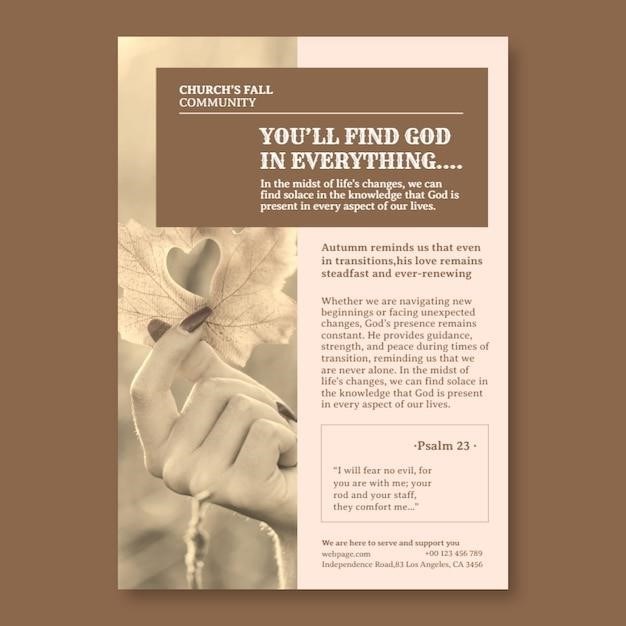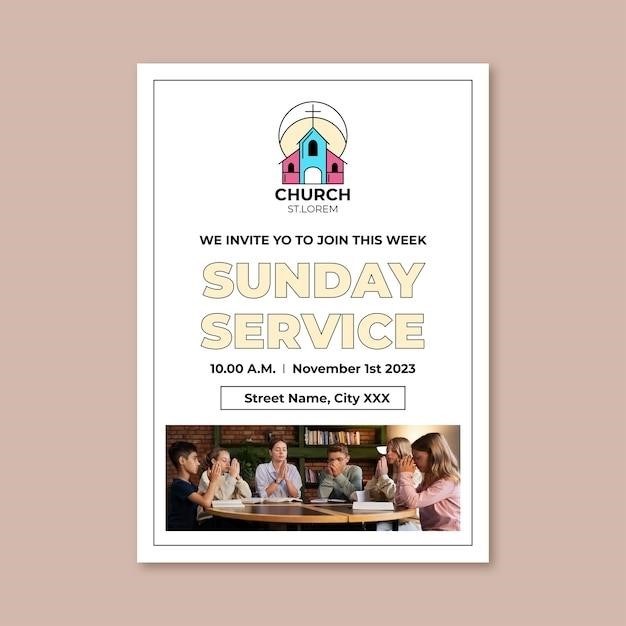
Finding and Using Church of God Minutes PDFs
Locating official Church of God meeting minutes in PDF format often involves exploring several avenues. Church websites frequently archive meeting records‚ providing a convenient online resource. Dedicated online portals or church record management systems may also house these documents. Additionally‚ contacting the church’s administrative office directly can yield access to archived documents‚ potentially including older minutes not readily available online. Remember to always respect any privacy policies or restrictions on access.
Locating Online Resources
The digital age offers various avenues for discovering Church of God minutes in PDF format. A primary starting point is the official website of the specific Church of God congregation or denomination. Many churches maintain online archives accessible to members and‚ sometimes‚ the public. These archives may include meeting minutes‚ often categorized by year or date. Look for sections labeled “Resources‚” “Documents‚” “About Us‚” or similar headings. If the church uses a dedicated church management software‚ the minutes might be accessible through a member portal within that system. Searching the internet using specific keywords such as “[Church Name] meeting minutes PDF” or “[Denomination] minutes archive” can also yield relevant results. Remember to carefully evaluate the credibility of any online source before using the information found.
Exploring online forums or discussion boards related to the Church of God could also provide leads. Members might share links to accessible minutes or point you toward internal resources. However‚ always exercise caution and verify the authenticity of any information obtained from unofficial sources. Finally‚ consider contacting the church’s administrative office or designated personnel for assistance in locating online resources or obtaining copies of the minutes if they are not publicly accessible.
Utilizing Church Websites and Online Portals
Many Church of God congregations and denominations utilize their websites as central repositories for important documents‚ including meeting minutes. Navigating these websites effectively requires a systematic approach. Begin by exploring the main navigation menu‚ looking for sections such as “About Us‚” “Resources‚” “Church Documents‚” or similar headings that might contain archived materials. Within these sections‚ search for links to “meeting minutes‚” “records‚” or “archives.” Pay close attention to any date ranges or organizational structures used to categorize the documents. Some websites may employ a search function; use relevant keywords such as “minutes‚” “meeting‚” “PDF‚” and specific dates or events to refine your search.
If the Church of God uses a church management system or online portal‚ accessing meeting minutes may require logging in with member credentials. These portals often provide members with access to a wider range of internal documents‚ including meeting minutes that might not be publicly available on the main website. If you encounter difficulties locating the minutes‚ don’t hesitate to contact the church’s administrative staff or designated personnel for assistance. They can provide guidance on accessing the documents or direct you to the appropriate resources.
Accessing Archived Documents
For older Church of God minutes‚ accessing archived documents might necessitate contacting the church’s administrative office directly. Many churches maintain physical archives of important records‚ including meeting minutes from previous years. These archives may not be readily accessible online. When contacting the church‚ be specific in your request‚ providing the date range or specific meeting you’re interested in. This helps streamline the search process for the church staff. Inquire about their procedures for accessing archived materials; some churches may have specific forms to fill out or require advanced notice; You might also need to specify whether you require a physical copy or a digital scan.
Keep in mind that access to archived documents may be subject to certain restrictions or requirements‚ depending on the church’s policies and the sensitivity of the information contained within the minutes. Be prepared to provide a valid reason for your request‚ especially if you’re not a current member of the congregation. Understanding and respecting the church’s processes ensures a smooth and efficient retrieval of the necessary information. Remember to always be polite and professional when contacting the church staff; their cooperation is essential in accessing the archived documents.

Understanding the Format of Church Minutes
Church of God meeting minutes typically follow a standard format‚ including a heading with key details (date‚ time‚ location‚ attendees)‚ a record of discussions and decisions‚ and a concluding section with the signatures of the secretary and presiding officer. Variations exist depending on the church’s internal processes.
Key Components of Meeting Minutes
Effective Church of God meeting minutes should consistently include several key components to ensure clarity and accuracy. These typically begin with a header section clearly stating the name of the organization‚ the date‚ time‚ and location of the meeting. A list of attendees‚ noting those present and absent‚ is crucial for establishing quorum and accountability. The minutes should then detail the agenda items discussed‚ including key points raised‚ motions made‚ and the outcomes of any votes. Specific decisions and resolutions should be clearly articulated‚ potentially including the wording of motions passed. Accurate record-keeping of financial matters‚ if discussed‚ is also important. Finally‚ the minutes should be signed and dated by both the meeting’s secretary and the presiding officer‚ signifying their approval and confirmation of the meeting’s proceedings. This comprehensive approach ensures that the minutes serve as a reliable record of the church’s official business.
Interpreting Resolutions and Decisions
Understanding the resolutions and decisions recorded in Church of God meeting minutes requires careful attention to detail and context. Resolutions often present formal statements of the church’s position on a specific matter‚ reflecting the outcome of a deliberative process. These may involve policy changes‚ financial allocations‚ or appointments to leadership roles. The wording of resolutions is crucial; precise language is used to avoid ambiguity. Decisions‚ on the other hand‚ can represent less formal conclusions or actions taken during the meeting. To interpret these accurately‚ one must consider the context of the discussion preceding the decision. Looking for supporting documentation‚ such as supporting reports or presentations‚ may aid in understanding the rationale behind the resolution or decision. Any ambiguity should be clarified by referring to those present at the meeting or by seeking further explanation from church leadership. Proper interpretation ensures an accurate understanding of the church’s actions and policies.

Legal and Practical Implications
Accurate church minutes are legally vital‚ providing a verifiable record of decisions and actions. They protect the church from disputes and ensure transparency‚ aiding in accountability and effective governance. These records also serve practical purposes‚ informing future planning and decision-making processes.
Importance of Accurate Record Keeping
Maintaining meticulous and precise records in church minutes is paramount for several key reasons. Legally‚ accurate minutes protect the church from potential liabilities and disputes. They serve as irrefutable evidence of decisions made‚ actions taken‚ and agreements reached during official meetings. This is particularly crucial in matters involving financial transactions‚ property ownership‚ or legal contracts. Accurate minutes also enhance transparency and accountability within the church community. Members can readily review the records to understand the church’s operational processes and ensure that decisions align with its values and mission. Furthermore‚ consistent and detailed record-keeping facilitates efficient continuity. Future church leaders can easily access past meeting minutes to understand previous decisions‚ ongoing projects‚ and established procedures. This ensures a smooth transition of leadership and prevents unnecessary repetition or conflicts. Finally‚ accurate minutes contribute to the overall effectiveness of the church’s governance and operations‚ fostering a well-organized and transparent environment for all members.
Potential Uses of Church Minutes
Church of God meeting minutes‚ meticulously maintained and readily accessible‚ serve a multitude of purposes beyond simple record-keeping. They provide a historical account of the church’s activities‚ decisions‚ and evolution over time‚ invaluable for understanding its trajectory and growth. These documents are essential for resolving disputes or clarifying past actions‚ offering a verifiable source of information for internal investigations or external inquiries. Minutes can be used to track the progress of specific projects or initiatives‚ demonstrating accountability and facilitating future planning. They also assist in budgeting and financial management‚ providing a clear record of approved expenditures and financial strategies. Furthermore‚ church minutes can be invaluable tools for planning future events or strategies‚ offering insight into past successes and challenges. For new members‚ they provide a valuable introduction to the church’s history and decision-making processes. Finally‚ well-maintained minutes can strengthen the church’s overall governance and transparency‚ building trust and confidence among its members.